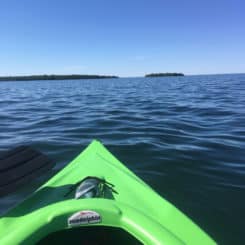
I push the paddle to the side and let my kayak float for a few moments to consider the real reasons why we want our schools to be the incubators of both free thought and inclusive practices. I ponder how we have expected education to get us to new places.
Bigger thoughts, new horizons, and innovative spirits, they all are the utopian goal of learning.
But here I sit in a little green boat and think why we keep pressing our educators to give our children and our aspiring minds what it seems adults absolve themselves from in mainstream society.
Do we always believe it is someone else’s responsibility to dismantle systemic woes or elevate people beyond any type of plight they may encounter? Are we all hands on deck for all learners, all the time? Are we ready shift mindsets so that structural constraints can be dismantled?
Educators don’t shy away from these questions, but I wonder if society does. Perhaps we educate so a new generation carries the torch of love and life more boldly than we have.
Perhaps we educate so a new generation carries the torch of love and life more boldly than we have.
Educators think about their work, their lesson plans, and their students so very often. We are always navigating the minefields of untapped potential. We employ best practices so that student engagement overturns the temptation for disorder and resistance to learning.
We look in the eyes of 11-year-olds and need to evidence our belief that all students can learn and succeed even if their surroundings or the stats might indicate otherwise.
We have to believe, not the unbelievable, but the unpopular.
We have to believe that relationships and nonverbals communicate as much as test scores and AP course enrollment numbers.
We need to not shy away from the data. We need to hold the student’s home life and action choices in class as just parts of the puzzle, doing our best to not let stereotypes dismiss the possibilities for the young girl in front of us. We need to take the young man and show him worth and dignity in a land that shows up with hate and distaste to his race, national heritage, and ethnicity.
We need to take the young man and show him worth and dignity in a land that shows up with hate and distaste to his race, national heritage, and ethnicity.
We are in the business of rewriting narratives so that divisiveness is not multiplied.
We get to believe that every minute, every tone chosen, every eye contact made is part of the pathway to our society’s freedom to hope, instead of despair.
I believe we get to educate against hate and it starts with the students in front of us. Teach on, teachers! Be ever encouraged, educators! Our work matters. Monday morning is near.
Nasreen Fynewever , M.Ed, is an educator, writer, and speaker with messages of hope, advocacy, adoption, and mental health. Born in Bangladesh and now married with three sons living in Minnesota, her heart burns for people to practice presence, to breathe hope, and to belong. She currently is a Dean of Students in the Brooklyn Center Community School district and is pursing her doctoral degree. This article first appeared on her website, and is reprinted with permission.
, M.Ed, is an educator, writer, and speaker with messages of hope, advocacy, adoption, and mental health. Born in Bangladesh and now married with three sons living in Minnesota, her heart burns for people to practice presence, to breathe hope, and to belong. She currently is a Dean of Students in the Brooklyn Center Community School district and is pursing her doctoral degree. This article first appeared on her website, and is reprinted with permission.


